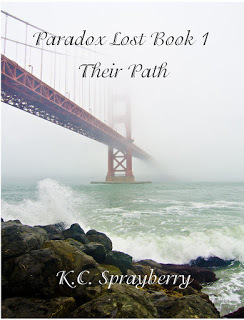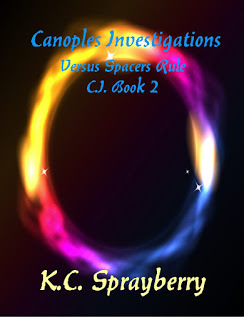K.C. Sprayberry's Blog, page 154
April 25, 2016
The Best Opening
It has often been said that a reader has to be captivated by a book in the first three chapters or you’ve lost them. I’m here to tell you that is completely off. You have to grab your reader on the first page, generally in the opening of the first paragraph, in order to keep them hooked.
I can hear the comments now. “How will I set up the scene?” “What about describing my characters?” “Are you nuts?”
Well, the last question isn’t far off the mark, but the others have no place in the opening sequence. Once you have decided on a theme for your book, set up the outline if you’re a plotter, thought out your character’s names, their backgrounds, and the sequence of events, it’s time to sit back and stare at that white page on your computer.
How do you open your book? How do you grab the reader by the throat and keep them hooked for the rest of the story? Because that can and has been done many, many times. It’s just a matter of learning what to do to get their attention.
Things you shouldn’t do is open your book with a self-aggrandizing soliloquy from the narrator (you) about the people involved, what their backgrounds are, and how they react to certain situations.
Why?
It’s boring. Yawn time. The reader has left the book before they’ve turned the page. Nobody cares that you spent months and months perfecting this prose, so you present what you think is an absolutely outstanding opening. They don’t want to know background, which is where this type of opening belongs.
Your reader wants excitement. They want to see the action from the start. They are going to demand an eye-popping, muscle tightening opening scene that is followed by a well plotted novel they’ll enjoy.
Does this mean you have to start with a twist and attempt to keep up with the action from the start?
Absolutely not. But you do need an interesting introduction to the action that is about to come. Instead of an opening that lies on the ground doing nothing, start with a sequence like this…
Sirens blasted. The crackle of flames echoed off the buildings. She stood on the sidewalk, her mouth hanging open, her eyes wide.
“It wasn’t supposed to happen like this.”
The words left her mouth before she realized she had an audience.
This works much better than…
Sharon was an receptionist for a law firm specializing in estate law by day. By night, she read great tomes of magnificent literature, in order to sound more educated than she was. Her entire existence was nothing more than going to work, having lunch at her work station, stopping at the library on the corner of her street, and going home to a dinner that usually consisted of whichever Lean Cuisine package her hand touched first.
To say her life was boring was an understatement. She had never known such boredom before moving to New York City the week after she graduated college, ready to become a well known actress. But blonde actress wannabes were a dime a dozen in this massive, uncaring city and she had to live, so she took the first job where they didn’t laugh her out the door.
On this hot summer night, she’d had a fit of inspiration. Even though she’d never even cooked before, she had decided to create an impressive meal that would give her some home cooked leftovers that would make her feel better about herself. The only problem was that she left the chicken frying on a back burner while she ran to answer the phone, only to discover a producer who had previously laughed at her mediocre looks wanted her to audition for a new role in a play he was doing off-Broadway.
The crackling and popping was Sharon’s first warning of trouble. The next was a reddish yellow glow filling her miniscule kitchen. Snatching up her purse and the books she’d checked out for a night’s reading, she’d raced out of the building, thoughtfully pulling the fire alarm as she did.
Yup. Great prose. And your reader vanished before they reached Lean Cuisine. This is flat. It lies there on the page doing nothing, even though it’s nicely written. All of this background can be inserted in small sections throughout the book, as Sharon is living through the consequences of her actions.
Remember, rock your opening. That’s the first step in creating a great book.
Published on April 25, 2016 00:00
April 24, 2016
Everybody Reads YA ~ Paradox Lost: The Ultimate Paradox

Happy “Everybody Reads YA” Sunday! Today I’m sharing an excerpt from my YA fantasy time travel novel: Paradox Lost: The Ultimate Paradox. The fight between the Sullivan triplets and Rogues heats up, with sides chosen and revelations none expected.

Matt paces back and forth in the place where he exists. He has lost his certainty that DJ and Elisa can save Dad. More than anything, Matt wishes he could go back in time, but remember what he knows now.
We wouldn’t have lost everyone in Mexico. Things would be different. DJ wouldn’t be struggling to understand all these changes. Elisa would be… Matt snickers to himself. The same. She never changes.
He understands why James made the deal with the Gateways about Elisa, but Matt still can’t comprehend why those very same Gateways won’t let him be part of the battle now going on between the evil Rogues and all other Travelers.
About the Author
Born and raised in Southern California’s Los Angeles basin, K.C. Sprayberry spent years traveling the United States and Europe while in the Air Force before settling in northwest Georgia. A new empty nester with her husband of more than twenty years, she spends her days figuring out new ways to torment her characters and coming up with innovative tales from the South and beyond.
She’s a multi-genre author who comes up with ideas from the strangest sources. Some of her short stories have appeared in anthologies, others in magazines.

The past changed the future …
. . . the future must salvage the past.
Falsely accused of murdering his father, DJ faces a terrible penalty. That’s the least of his worries—Uncle Toby and his army of Rogues are bent on tearing history apart, and DJ and his allies have to stop them any way they can. But only a True Neutral can save their world, and The First, his family’s ancestor, is long dead. His brother Matt was killed by Toby’s actions, and his sister Elisa is fighting her own demons.
The past created by their uncle needs to be uncreated into what it was meant to be. And these three teenagers, triplets and direct descendants of The First, must learn to ally with each other to correct the errors made real in the past.
And the Gateways reveal themselves as something no one ever suspected….
Paradox Lost: The Ultimate Paradox
Published on April 24, 2016 00:00
April 20, 2016
Park Your Ego at the Door
I see this too many times in my job as an editor in chief. Authors believe they’ve brought you the next Harry Potter, Divergent, or Hunger Games. They’re arrogant, demanding special attention for their book, because it will be so great. And their ego gets the best of them, in the demands they make to the way they speak to a person in an email.
I’m here to tell you to park your ego at the door and approach a publisher humbly.
I can hear the comments now. “Why should I do that?” “Publisher XYZ is lucky I even considered them.” “The Big 5 will be knocking on my door soon. Why do I have to be nice to you?”
Well, first of all, let’s go with the last comment before all the others. If the Big 5 were about to sign you to a multi-million dollar contract, you wouldn’t be submitting to a small publisher without an agent. In fact, we would have never seen your book. It would be in serious negotiations for an advance and other considerations. So, that excuse doesn’t fly with me at all.
Now, why should you park your ego at the door? Well, it’s a little thing called being humble. You are asking a publisher to take a chance on an unknown quantity. They don’t know you, don’t know if you’re willing to do the bulk of promotion work, and sure don’t know how well you work and play with others. All they have to go by when evaluating your work is the cover letter you’ve put on your submission and your novel. That’s it. With that small amount of information, an editor in chief is expected to decide if you’re worth the investment. That means leaving your ego out of your submission goes a long way to acceptance.
Is a publisher lucky you submitted to them? That depends not only on the content of your book but also on your attitude. If you expect a publisher to have a full promotion team ready to make your book, and only your book, the next best seller, you are not going to find that with a small publisher. If you are looking for cover art that is done to your exact specifications, which might include a photo shoot of a top model, or one designed from scratch, you are going to the wrong place.
Once your ego is parked, you will soon discover that becoming the next big author today requires a lot of work. First, you will have to brand your name, become known on social media as an author of good books. Second, you will have to be willing to concede that small publishers aren’t the Big 5, but they are the best place to get your start. Finally, you will have to understand that the staff at a small publisher aren’t there for your personal use.
We are there to make your book the best possible book it can be and help you find ways to promote it.
Published on April 20, 2016 00:00
April 19, 2016
Past, Present, Future
A story that begins in the future, brought about by actions in the past, and with implications on the present is always entertaining for teens. It must, however, have an appeal to their sense of adventure. And of siblings each trying hard to prove they’re the best at what they do.
Include a world changing event, some nasty types ready to cause trouble, and sibling rivalry tripled and you have the potential for a blockbuster. When that event is an earthquake and fire that reshaped a now major metropolitan area, you have the chance to teach teens a little bit about their heritage.
Paradox Lost: Their Path introduces readers to triplets, DJ, Matt, and Elisa. These aren’t ordinary triplets. Not by a long shot. They’re gifted with telekinesis and many other talents that allow them to travel through time. Always adventurous since they were young, they are now in the enviable position of nearing the point where they’ll graduate school and be able to Travel without someone looking over their shoulder. Only one little problem exists—Will they actually make it to graduation?
Blurb
The past changed the future
… the future must salvage the past.
DJ, Matt, and Elisa are mostly normal teens. They have their friends, and their squabbles, and their dreams of the future. Yet, they are also very special teens, brought into this world to fulfill a prophecy made by an ancestor 200 years in their past. One of them dies, one receives incredible powers, and one discovers a place no one suspected she would have.
It was meant to be nothing more than a fun and adventurous spring break from the Beaufort School of Visionary Studies for triplets DJ, Matt, and Elisa. Little did they know that the prophecy made about them was about to catch up. When they are warned that Rogues have targeted them and their family, they go into hiding to protect everyone. But the Rogues have other plans. Can they make the right choices even though they know others will be hurt by their decisions? Even when one of those decisions means certain death?

Paradox Lost: Their Path
Published on April 19, 2016 00:00
April 18, 2016
Past or Present Tense
Another decision writers have to make when beginning a story is whether to use past or present tense. I move back and forth between both. The decision is solely based on how the story needs to be told rather than any logical method.
Of course, there is an allegedly hard and fast rule. That is all stories must be told in third person, past tense. That couldn’t be further from the truth. The way a story is told is entirely dependent on how the author presents it well.
It is true that third person, past tense books are more prolific. It’s an easy way to write, but you, as the author, need to ask yourself if your story can be presented in a better way.
Past tense works well for some genres, such as romance, fantasy, and science fiction, although there are exceptions even there. But the choice to make is something that no one can clearly say for any book, unless they are the creator.
In my experience, young adult books work very well in first person, present tense. The story flows in the here and now. Teens can relate to this, as it’s like it’s happening in the here and now.
Past tense, first person is also good for teen books. I’ve used this in historical novels with great effect.
First person, past tense is difficult to maintain. The urge to tell rather than show becomes too much to handle and the author can sometimes become preachy—something we all want to avoid.
Third person, past tense is what the great majority of authors use. It’s relatively easy to write in this mode and the story flow is great. But there are limitations to this type of story, even though multiple viewpoints are easier to do. The loss of the sense of the here and now is one of this issues. Another is that you’re writing the same way as almost everyone else and that gives the reader the sense they’ve been there and done that.
The choice of which tense to use is entirely up to you, the author. But it’s always a good idea to play around and see how your story works in many different ways.
Published on April 18, 2016 00:00
April 17, 2016
Everybody Reads YA ~ Awaken The Dream

Happy “Everybody Reads YA” Sunday! Today I’m sharing an excerpt from my YA fantasy short story: Awaken The Dream Fated to wed long before they were born, a fae and a human face the ultimate test.

He stood before the veil separating the worlds. His eyes strained to find The One, the woman promised to him. These females were weak, dependent upon men.
“The muses were wrong.” He stared hard into the place where ordinary mortals dwelled. “None has yet exhibited the traits that indicate she is of the Fae.”
His eyes lit upon one female in particular. On one level, she was as ordinary as the rest, yet the glow upon her skin, the longing for a different future in her eyes alerted him to something more.
“She is here. The foretelling has come true.” He turned, ran into the realm of the Fae, seeking “I must alert Ewan. He’ll know what to do.”
About the Author
Born and raised in Southern California’s Los Angeles basin, K.C. Sprayberry spent years traveling the United States and Europe while in the Air Force before settling in northwest Georgia. A new empty nester with her husband of more than twenty years, she spends her days figuring out new ways to torment her characters and coming up with innovative tales from the South and beyond.
She’s a multi-genre author who comes up with ideas from the strangest sources. Some of her short stories have appeared in anthologies, others in magazines.

Love can be found in the darkest places...
Wolf Paw Publications presents the 2015 Charity Anthology. From the minds of 11 of today's up and coming indie authors come 10 tales of Fantasy Romance that are sure to please.
From simple boy meets girl to BDSM, there's a little something for everyone. Each story shows how the heart can make anything happen and that love can be found in the strangest of places. Join us as we surrender in the darkness.
Proceeds from this anthology go to THE ANTI-VIOLENCE PROJECT (http://www.avp.org/) The New York City Anti-Violence Project empowers lesbian, gay, bisexual, transgender, queer, and HIV-affected communities and allies to end all forms of violence through organizing and education, and supports survivors through counseling and advocacy.
Awaken The Dream
Published on April 17, 2016 00:00
April 13, 2016
Disembodied Body Parts
No, I’m not about to start writing horror novels, although some have indicated my young adult psychological thrillers do fall into that category. What I’m talking about today are those body parts that seem to carry the action without input from the character.
We’ve all seen this in published books. My eyes caught sight of… or my feet carried me away… or any number of body parts doing a job without the rest of the character taking part in the action. Writers are visual artists. We see the scene unfolding and portray that to the reader, but sometimes we become too involved in the story and those body parts take on a life of their own.
Now, if you are writing the next great zombie thriller, or perhaps a crime fiction novel, you can get away with this, but only in relation to the overall story. But for the rest of us? Well, let’s just say that we need to be more observant of when those eyes, legs, or hands are off on their own.
Really. This is very important. The parts of the body have to remain with the rest. They can’t take off and hold up the story.
Imagine, if you will, exactly how the reader is sitting there, staring at a passage that is pretty much “my eyes followed her along the street, gazing at her great beauty, walking around the corner…” Yeah, time to stop. Can you see a pair of eyeballs bouncing up and down on the sidewalk, following some poor woman as she peeks over her shoulder and tries to get away? That’s sure the picture I’m getting, and you can bet that if I’m getting that picture, the reader is too.
One can argue that we don’t like to repeat words. True, we don’t want to repeat a word too often. But for eyes, we can use look, gaze, see, and so many others that are available in your word processor’s thesaurus.
New authors aren’t the only ones guilty of this problem. Many well published authors fall back on the disembodied body part in order to make a point. From the feedback I’ve received from many readers, all you’ve done is add a horror element to your book. In fact, the normal reaction I get from these people is, “Gross!”
So, the next time you’re tempted to let a body part go off on its own, remember to actually visualize what you just wrote looks like to a reader. Yeah. Not so pretty. Time for a rewrite.
Published on April 13, 2016 00:00
April 12, 2016
Animals in Stories
It’s always nice to have pets in a story. They add a certain element of responsibility for the teen, a way of interfering with the normal life they’ve come to expect. Of course, no animal in a story would be worth its weight if there weren’t problems.
The normal issues with animals—feeding, exercising, cleaning up their messes—takes on a whole new level when those pets are on a space station. Yes, even science fiction takes on a more entertaining aspect when an animal is on the loose. Especially of those pets are a bit different from the usual cat and dog. Say they’re cloned to resemble the familiar pet but have many different interesting additions.
Canoples Investigations Versus Spacers Rule leads the reader into another tale of a day without end. BD and crew are hot on the trail of a group of splifters (shoplifters) who are making their lives miserable with rekats and codos that are far from their normal. Drop a four-year-old determined to emulate BD and you have an interesting tale of life on a space station.
Blurb
Canoples Station is crawling with animals. Illegal ones, to be exact, hungry for new owners. And this is just the beginning. Another horror lurks beneath, one that hits home hard for BD and his friends.

Canoples Investigations Versus Spacers Rule
Published on April 12, 2016 00:00
April 11, 2016
First Person Stories
important is whether they’re going to use first or third person for their narrative. This is an important decision, one not to be taken lightly.
When I started writing, all the experts warned me away from first person stories. They’re limited I was told. You won’t be able to get the same richness as a third person story. And the one I love best, you can’t use multiple viewpoints in first person.
Thus, the decision should always be third person, according to those experts. So, I followed the advice and worked with third person. I immediately noticed something about my young adult books. There was an important element missing. They were flat. The characters didn’t engage the reader.
What to do? How to improve these books, all with a great story to tell?
While reworking Softly Say Goodbye for the umpteenth time, I made a decision. Writing has rules. Some are hard and fast, particularly those about grammar and spelling, but others are more flexible. What if the decision between first and third person was one of those flexible rules.
That’s when the transition began. I moved into first person stories for my teen novels. And the flat characters came to life. They owned the story. Their emotions were right in the forefront for the reader to see and feel. These fictional teens became real people.
One thing a writer must always remember is that we must be flexible in our work. There is a place for a first person story. You can do multiple viewpoints in first person, as long as the reader knows which character is in charge at the moment.
Another thing the writer must remember is that unless carefully worded, first person can become preachy. That’s something you don’t want to happen. It is more difficult to write this way, but the rewards are well worth the effort.
Published on April 11, 2016 00:00
April 10, 2016
Everybody Reads YA ~ To Live and Die

Happy “Everybody Reads YA” Sunday! Today I’m sharing an excerpt from my YA fantasy short story: To Live and Die. A call to arms sets Troy on an uncertain path.

A glance at the early afternoon sky. Troy Aielel shaded his eyes and stared eastward, laying aside his hoe. A dust devil on the horizon appeared innocuous, but he shivered in the warm, early spring air. Looking at the neat rows of cabbages, beans, and squash just sprouting, he wondered if he would ever see them ripen. Visitors in the middle of the day and midweek, stranger occurrences had surely occurred in his lifetime, yet he remembered none. He trudged toward his house. Nearing the door, he looked around for his parents. They would want to greet the visitors. Emptiness swept over him again. Six months ago yesterday, his parents had fallen ill and wasted away. To this day, rumors persisted as to what had taken them. As a result, Troy avoided the local village and most of his neighbors.
About the Author
Born and raised in Southern California’s Los Angeles basin, K.C. Sprayberry spent years traveling the United States and Europe while in the Air Force before settling in northwest Georgia. A new empty nester with her husband of more than twenty years, she spends her days figuring out new ways to torment her characters and coming up with innovative tales from the South and beyond.
She’s a multi-genre author who comes up with ideas from the strangest sources. Some of her short stories have appeared in anthologies, others in magazines.

Troy Ailel left his farm behind upon his parents’ deaths, answering the call for Armsmen to protect the galaxy from an unknown evil. He expected to fight, but not the enemy he got, nor for the cause he sought.
To Love and Die
Published on April 10, 2016 00:00



